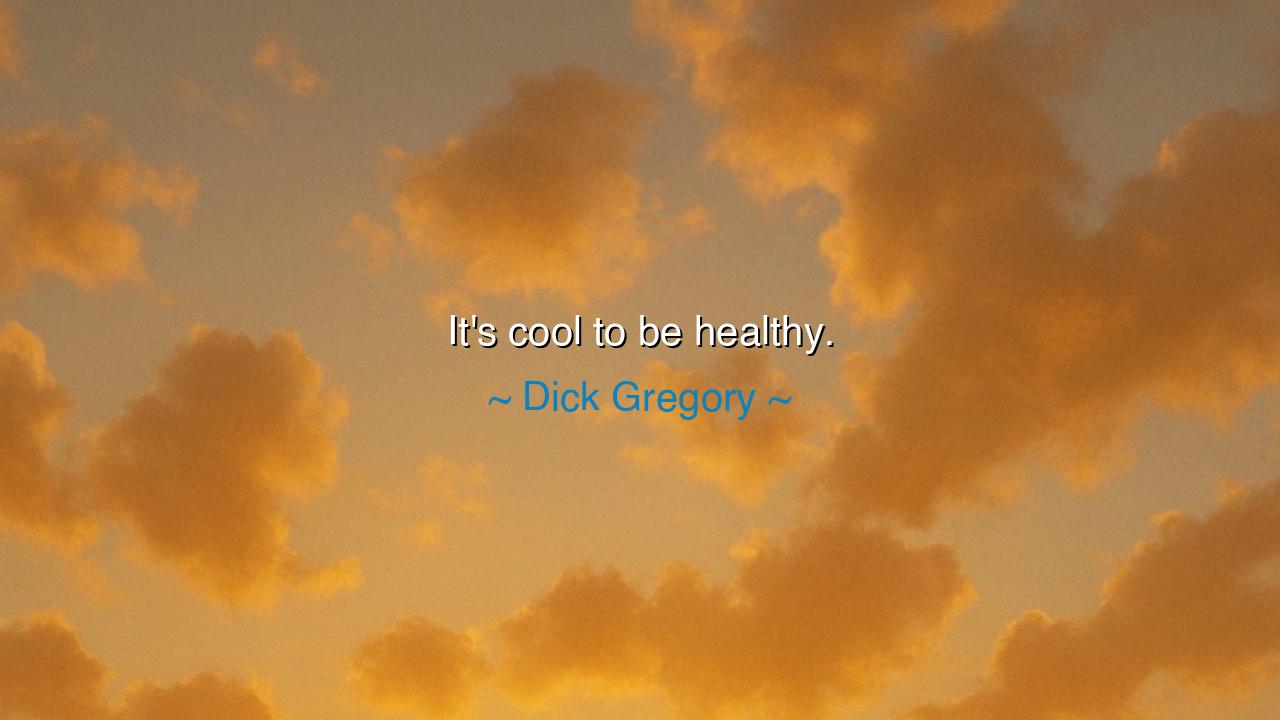
It's cool to be healthy.






The words of Dick Gregory—“It’s cool to be healthy”—though brief, carry the radiant simplicity of eternal truth. Spoken by a man who was not only a comedian but a prophet of consciousness, these words are more than advice about diet or fitness—they are a call to enlightenment. In their rhythm, we hear the ancient echo of wisdom itself: that the body is not merely flesh, but the sacred vessel of the soul, and to keep it strong and pure is an act of reverence. Gregory, who lived through struggle, laughter, and revolution, understood that to be truly healthy—in body, mind, and spirit—is not a vanity, but a victory.
To understand his meaning, one must know the man. Dick Gregory was a pioneer in the battlefields of both comedy and civil rights. He used laughter as a sword, and truth as his shield, cutting through hypocrisy with grace and wit. But beyond his voice on stage was his deeper mission: to awaken the people, especially the oppressed, to their own power. He saw that slavery of the body often began as slavery of the mind—and that true freedom required self-mastery. To Gregory, eating well, exercising, and nurturing health were not luxuries of the privileged—they were acts of rebellion, declarations of dignity in a world that profited from sickness and addiction.
When he said, “It’s cool to be healthy,” he was challenging an entire culture that glorified destruction—of the body, of the earth, of the spirit. In his time, and in ours, society often equates pleasure with poison, and rebellion with self-harm. The young are taught that recklessness is strength, that excess is freedom. Gregory stood against that lie. He reminded the world that discipline is divine, that clarity of mind and purity of body are not dull or weak—they are the tools of warriors and thinkers. His “cool” was not the shallow fashion of the day, but the cool of control, the cool of wisdom that burns slow and steady rather than flaring and fading like a spark.
This truth is as ancient as the sages. The philosophers of Greece, the mystics of India, the healers of Africa—all knew that health is the foundation of greatness. For how can the mind rise to noble thoughts when the body is burdened with decay? How can a man lead or love when his strength is spent by indulgence? The great Heraclitus once said, “The soul is dyed with the color of its habits.” So too does health reflect not just what we eat, but what we believe. Gregory’s words remind us that to treat the body with reverence is to honor the spirit that dwells within it.
Consider his own example. In the 1960s, while fighting for civil rights, Gregory adopted a vegetarian lifestyle, long before it was popular. He fasted for peace, abstained from processed food, and spoke fiercely against the toxins that modern life placed upon the table. He understood that health was not a matter of appearance, but of alignment—between body and conscience, between what we consume and what we believe. He showed the world that strength and compassion could coexist, that one could fight injustice outwardly while cleansing oneself inwardly. His life became a living sermon on the sacredness of balance.
In this way, his message transcends time. To be healthy, in Gregory’s philosophy, is not merely to survive longer—it is to live deeper. It is to awaken each day with energy enough to serve, to create, to love. It is to walk lightly upon the earth, honoring it by honoring oneself. It is to reject the poisons—chemical, emotional, spiritual—that dull our senses and enslave our will. When he said it was “cool,” he was speaking to the youth, to those dazzled by the mirage of rebellion. He was offering a new kind of defiance: the rebellion of self-respect.
The lesson, then, is both simple and profound: care for your body as you would care for your freedom. Every meal, every choice, every moment of rest or movement shapes not only your life, but your destiny. To be healthy is to be ready—to fight, to think, to love, to build. Health is not a trend, nor a punishment—it is a privilege and a duty. The strong body gives rise to a strong mind, and the strong mind gives rise to a free people.
Therefore, let Gregory’s words echo through the ages: “It’s cool to be healthy.” Let them be your creed. Find joy in the discipline that keeps your spirit sharp and your body alive. Let your health become a quiet act of revolution, a way of saying to the world, “I will not be destroyed by what destroys others.” For when you are healthy in body, mind, and heart, you become a vessel of light—and that, indeed, is the coolest thing of all.






AAdministratorAdministrator
Welcome, honored guests. Please leave a comment, we will respond soon